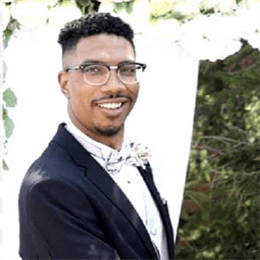Transferring from Arkansas Baptist College, a Historically Black College and University (HBCU), to a predominately white institution stirred a mixture of emotions for Jordan Stewart.
The senior political science and Spanish major said leaving a place that accommodated his needs as a person of color to an institution that arguably lacked such perspective in areas of its curriculum was a tough transition.
He reflected on the discomfort he felt being in high school classrooms, where he was one of the few Black kids, but also on how much of a relief it had been to attend an HBCU where topics discussed made him feel included, heard and fueled his purpose to become the youngest Black man to run for Congress.
During his two years at Arkansas Baptist College, where he got his associate’s degree, Stewart took a course called Topics in American Studies: Remembering and Forgetting: Race, Violence and History in the U.S.
“[The professor] taught it in a way where everyone in the class could understand it, and it was really relatable,” Stewart said. “It kind of made me think that’s the kind of career path I want to go into.”
Once Stewart transferred to Montclair State University, he realized he didn’t entirely feel the same way in his classes as he did at Arkansas Baptist. But the lessons and experiences Stewart’s professors instilled in him and the obstacles he faced in high school influenced him to start Soul Civics (@soulcivicsinc), an Instagram account that educates others on the importance of civic engagement and political enlightenment.
However, Stewart did not want to be limited to a social media platform.
For that reason, he’s in the process of curating a civics course at Montclair State where students, specifically students of color, can be encouraged to take a political stance that promotes change and different perspectives our society needs to prosper.
“Today with social media, everyone is kind of following what’s going on, politics-wise, but I don’t think people understand the importance and how civics and politics kind of go hand in hand,” Stewart said. “So, I thought that was really interesting. It started off as me just posting cool, little fun facts. Then, it kind of morphed into, ‘OK, how do I turn this into an accredited course?’”
To guide him through the making of the civics course, Stewart partnered with Evan Johnston, a doctoral student pursuing urban education at New York University (NYU). Johnston’s focus in particular is investigating intersections of race, gender and ability in how they construct moments of opportunity and disability in the classroom. He also mentors for the Holmes Honors Program at Montclair State.
“It is of the utmost importance that people of color and people living at the economic and social margins of our society [by design] choose to engage and remain engaged in our democratic systems,” Johnston said. “[We need to engage in] methods of voicing our dissatisfaction with the lack of true representation and change from those who claim to serve or even care about our interests.”
Johnston said the course will explore both history and current events.
“The civics course [will unveil the importance of] reforming our conception of what policing is [and examining what] its originating functions were: the enforcement of enslavement and punishment of those who would dare to dream of liberation,” Johnston said.
Evan Collier, a Fordham University graduate who received his Master of Studies in Law in corporate ethics and compliance, is also assisting Stewart to curate the course.
According to Collier, the course would further cover foundational topics for students to engage in American democracy through government, law, economics, geography, discussions about current events, student participation in school governance, news media literacy, social-emotional learning and live simulations of real issues.
Collier further asserted the effectiveness of students, particularly students of color, actively engaging in politics.
“This course would be hands-on every day,” Collier said. “There is no textbook because we are going to engage in physical practice rather than simple mental repetition. That is, utilizing current events as a foundation for our discussions, activities and lessons that are at the forefront of many ‘taboo’ conversations for people of color.”
Collier expressed that giving a necessary perspective to students of color allows them to be stimulated beyond their regular curriculum, and gives them real-life experience to use their perspective that has historically been lacking in society. Omitting these students from political enlightenment, they argue, can leave them confined. Courses like Stewart’s could help them understand and engage in politics through a lens that our democracy needs to thrive.
“Going back to having respective majors — each of us have unique perspectives on how the world can be better, but many of us feel boxed in,” Collier said. “The interesting thing about civics is that it directly impacts you whether you are actively engaged in it or not — so, why not have a say in your future?”
Despite the journey it will take to get to his goal, Stewart believes the youth has the essentials of what it takes to be revolutionary. He urges them to show how they can.
“I feel it’s very important for us to know the rules of the game in order to play the game,” Stewart said. “Politics is the game but civics is the rules. The institutions that are set up and the people that are in power are in power for a specific purpose. And if you want something [to] change, you can’t change that without knowing the ground rule of the game.”





